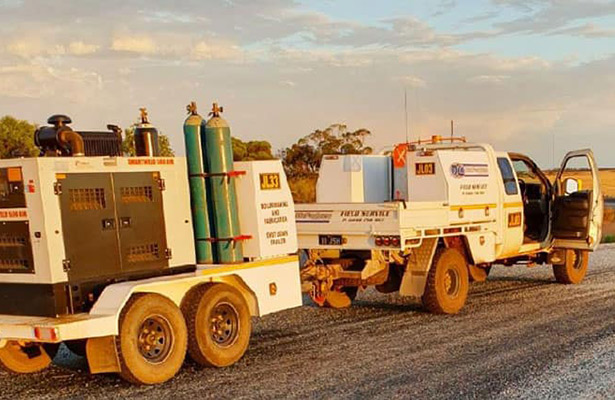
Air compressors can be one of the most versatile and useful pieces of equipment to have in a home garage or workshop. They can be used for a variety of tasks, from inflating tires to powering pneumatic tools. While at Mobile Energy Australia, we specialise in vehicle mounted air compressors, we still thought it would be handy to offer some advice on what to consider when purchasing your new workshop air compressor. After all, why stop your projects when you get home after travelling on the road?
Noise Levels
Your workshop or home garage isn’t likely to be as spacious as an outdoor worksite. That’s why it’s important to purchase an air compressor that doesn’t produce as much noise as others. This will protect your long-term hearing and reduce the chance of any neighbours or family members complaining about your work.
There are several ways you can make your air compressor quieter such as using a sound-proof blanket to wrap the compressor in. However, there are also certain models of air compressors that will be quieter than others. Electrical air compressors are quieter than petrol-powered units as they don’t require petrol to power the compression pumps. Rotary screw air compressors are also quieter than traditional reciprocating models.
PSI & CFM
Most workshop-level air compressors will produce more than enough PSI (pounds per square inch) for pneumatic garage tools such as nail guns and impact wrenches. Most of these tools require between 80 and 90 PSI, which will be anywhere from 30-70 PSI below what most air compressors offer.
When it comes to CFM (cubic feet per minute), it really depends on how large your air compressor’s tank is. For larger tanks, the CFM can reach a higher status before you risk the unit needing to rest, while smaller tanks won’t provide that same luxury. Similar to PSI, most workshop tools won’t require particularly high CFM, but it’s considered safe to purchase an air compressor that provides at least 1.5 more CFM than what is required to operate the tool.
Size
This really depends on the size and layout of your garage, however a smaller air compressor is always more desirable so you can make more space for the rest of your tools and equipment. If you do need to buy a larger air compressor, make sure it has wheels so you can easily move it around your workshop if you need to make room.
In terms of tank size, it largely depends on the types of tools you’ll be using the compressor for. A smaller tank size can handle smaller tools that don’t require that much PSI or CFM to operate, while a larger tank may be necessary for more complex jobs where you don’t want the unit cycling off and on constantly.
Get Vehicle Mounted Air Compressors from Mobile Energy Australia
From quieter electrical air compressors to powerful underbonnet options, Mobile Energy Australia has it all. Begin your MEA experience today by giving one of our friendly team members a call on (07) 3273 6803.
